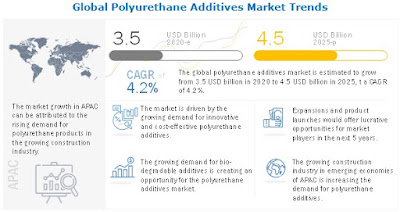Tuesday, 5 October 2021
Polyurethane Additives Market Driver: Increasing demand for innovative and cost-effective additives
The polyurethane additives market size is projected to reach USD 4.5 billion by 2025 at a CAGR of 4.2% from 2020. The demand for polyurethane additives market is increasing, owing to the growing demand for innovative and cost-effective additives.
Flexible polyurethane foam is an important material finding usages in mattresses, furniture cushioning, bedding, carpet underlay, automotive interiors, etc. These being highly cellular polymers are easily ignitable. This characteristic limits their greater use in areas that require them to pass certain fire regulations as fire hazards are associated with the use of these polymeric materials, which can cause loss of life and property, are of particular concern among government regulatory bodies, consumers, and manufacturers alike. This further drives the demand for innovating new additives such as flame retardants to reduce the flammability of polyurethanes. A large range of flame retardants such as inorganic phosphorus, organophosphorus, nitrogen, halogen, and phosphorus-halogen based compounds are used to meet the demand for the required additives.
To know about the assumptions considered for the study download the pdf brochure
On the basis of end-use industry, the automotive & transportation segment is estimated to lead the overall polyurethane additives market in 2020.
Polyurethanes are used in various parts of an automobile. In addition to the foam that makes car seats comfortable, bumpers, interior “headline” ceiling sections, the car body, spoilers, doors and windows all use polyurethanes. Polyurethane enables manufacturers to provide drivers and passengers significantly more automobile mileage by reducing weight and increasing fuel economy, comfort, corrosion resistance, insulation, and sound absorption.
On the basis of application, the foams segment is estimated to lead the polyurethane additives market in 2020.
Polyurethane foams are manufactured by reacting polyols and isocyanates in the presence of a blowing agent and an amine catalyst. The blowing agent is carbon dioxide, which is formed as a by-product of the reaction between water and isocyanate. The amine catalyst is known to accelerate the reaction. Polyurethane foams are of two types, namely rigid polyurethane foam and flexible polyurethane foam. Foams offer various properties such as comfort and insulating properties when used in various industries such as automotive and building & construction, which is driving the market.
On the basis of region, APAC is estimated to lead the polyurethane additives market in 2020.
APAC is projected to be the fastest-growing market for polyurethane additives. The rising population, increased demand for automobiles, growing disposable income, rapid industrialization, and increased urbanization are driving the APAC polyurethane additives market. China is the largest market for polyurethane additives in the region. China is also a major producer and consumer of polyurethane additives in the region as it has a huge manufacturing base. Apart from China, India and South Korea are projected to grow at a decent rate during the forecast period.
The key players in the non-phthalate plasticizers market include Evonik Industries (Germany), BASF (Germany), Huntsman Corporation (US), Covestro (Germany), Dow Inc. (US), Lanxess AG (Germany), lbemarle Corporation (US), Tosoh Corporation (Japan), Momentive (US), and BYK (US). These players have established a strong foothold in the market by adopting strategies, such as expansion and new product launch.
Don’t miss out on business opportunities in Polyurethane Additives Market. Speak to our analyst and gain crucial industry insights that will help your business grow.
Subscribe to:
Post Comments (Atom)
Non-Biodegradable Plastics to Lead Bioplastics & Biopolymers Market During Forecast Period
In recent years, there has been a growing awareness that the use of non-biodegradable plastics is leading to large amounts of plastic waste ...

-
The global polylactic acid market is projected to reach $43.7 billion by 2024, growing at a CAGR of 5.2% from 2018. The industry is charact...
-
The global propylene glycol market was valued at USD 3.47 Billion in 2016, and is projected to grow at a CAGR of 5.8%, to reach USD 4.60 ...
-
In recent years, there has been a growing awareness that the use of non-biodegradable plastics is leading to large amounts of plastic waste ...




No comments:
Post a Comment